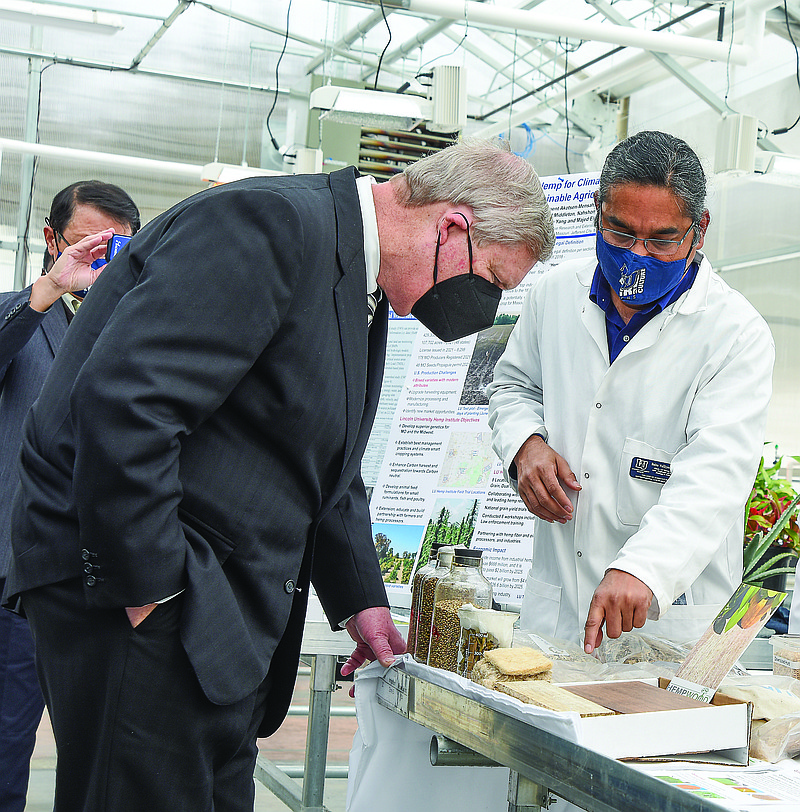Lincoln University hosted the U.S. Department of Agriculture on Monday, where USDA Secretary Tom Vilsack announced the federal government would be offering $1 billion in grants to support climate-friendly farming, ranching and forestry practices.
While he appreciated the university's commitment to climate-smart practices and its work in promoting them in the area, Vilsack said he was particularly struck by Lincoln's research on industrial hemp.
"The hemp project is really interesting because it has so many different potential opportunities," Vilsack said. "Industrial hemp is just a tremendous crop -- the fact that you can have building material, you can have clothing and a variety of other ways is pretty interesting."
Vilsack began his visit to Lincoln's campus with a tour of the recently reopened Dickinson Research Facility and hearing from a class of agriculture students.
Dickinson was opened in September after a 2015 fire destroyed the facility.
The lab and greenhouses are primarily used for research within LU's College of Agriculture, Environmental and Human Sciences, which incorporates the university's cooperative research and extension efforts.
Vilsack talked to university researchers and reviewed their work on climate change's influence on water resources, growing quinoa grains and greens as edible crops and sustainable agriculture of industrial hemp.
Lincoln University is home to the Hemp Institute, which is helping develop standard operating procedures for hemp farms, analyzing the crop and any characteristics that can add value, and providing economic analysis of crop production and the industrial market.
"There's some good stuff going on here," Vilsack said.
Lincoln University President John Moseley said the USDA's visit was a great opportunity to show off campus and he expects the new grant program to benefit the school's agriculture department for years to come.
"We all know that agriculture is so important to this great state and to this region of the state here in Mid-Missouri," Moseley said. "So we expect it to hopefully get great response from our local farmers and producers to continue to grow on what's already a tremendous income producer for this community."
Partnerships for Climate- Smart Commodities, the USDA's new $1 billion grant program, will be used to finance pilot projects that promote sustainable agricultural practices and can measure reductions to greenhouse gas emissions.
Vilsack was at Lincoln University on Monday to announce details for the program and discuss President Joe Biden's plans to engage agriculture, forestry and rural communities in the nation's fight against climate change.
Climate-Smart Commodities, as the program refers, are agricultural products grown or made using practices and techniques that reduce greenhouse gas emissions or store and capture carbon.
"In terms of where it's headed, what I'm interested in at the end of the day are new income sources and higher value income sources for farmers," Vilsack said. "The model of commodities and feeding commodities works for some -- for a very small percentage -- but not for all. We got to have a system that provides more opportunity for our smaller and mid-sized operators to keep them in business."
The USDA is accepting applications for larger projects, costing between $5 million to $100 million, through April 8 and is accepting grant applications for smaller pilot projects, costing at least $250,000, through May 27.
Vilsack said the program will complement the USDA's existing conservation programs to encourage climate- safe practices while adding new revenue streams for farmers and producers.
The $1 billion in grant funding, which will come from the USDA's Commodity Credit Corporation, is available to local, county, tribal and state governments, small businesses and for-profit organizations, nonprofits and institutions of higher education.
More income sources, engagement with ecosystem markets, higher value propositions for crops and converting bio-waste into products that can also be sold are ways smaller farmers can take advantage of the changing agricultural landscape, Vilsack said, and the Partnerships for Climate-Smart Commodities program supports those efforts.
With industrial hemp, for example, Vilsack said Lincoln University could engage with partners to determine how growing practices can support the climate and could apply for USDA grant funds to pay farmers to embrace those climate-friendly practices throughout the state.
Grant recipients and their partners would also be expected to monitor, evaluate and quantify the results of implementing the new climate-friendly practices.
After the hemp product is produced, it would be certified "Climate Smart" and farmers could sell at a higher price, Vilsack said.
That "Climate Safe" designation is one way to add value to products farmers sell, he said.
Similar to the organic designation on foods and crops produced without pesticides and herbicides, Vilsack said he would expect the market to push the "Climate Smart" designation on products that are verified to be sustainable. He said there's already a rising demand among consumers.
Vilsack said the results of the pilot programs, which will help determine what climate-friendly practices work and don't work, will also likely be used to form policy into the future.
"It's just great when our folks really get a chance to show people in the fight what it is we're working on," Moseley said. "We think we're at the cutting edge of some tremendous research here at Lincoln."

